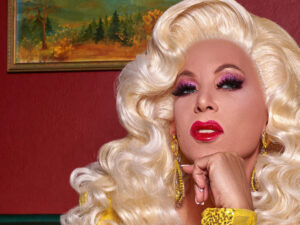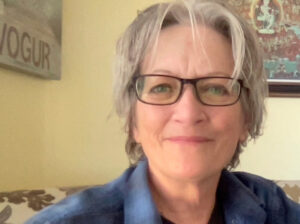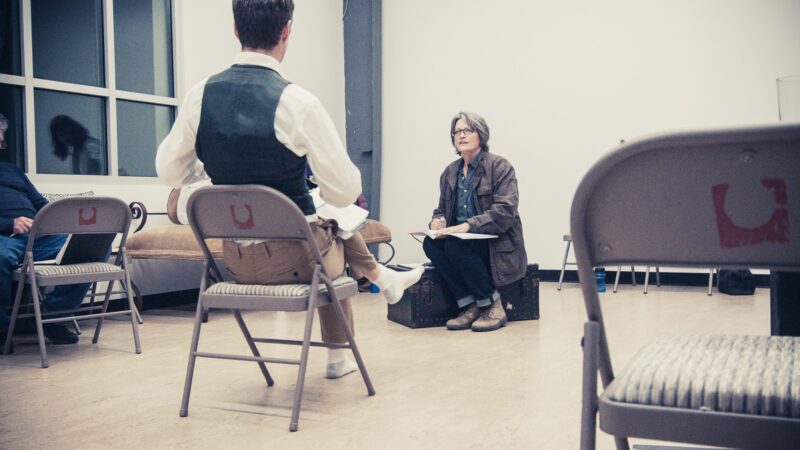Alumni of the USC School of Dramatic Arts are explicitly celebrating their queer identities in the theatre and uplifting the stories of their LGBTQIA+ peers. Their work, careers and identities are intergenerational and intersectional — they are forging innovation and creativity against the grain.
Drag and Anna Deavere Smith

Keith Levy (aka Sherry Vine) (MFA ’88) was not surrounded by queer representation as a student at USC. Even in Los Angeles, there were very few actors doing drag at the time. But actor and playwright Anna Deavere Smith, a visiting faculty member, saw Sherry Vine performing in drag and encouraged further pursuit of the art form.
“It’s all Anna Deavere Smith’s fault,” Vine laughed. “She pulled me aside and said, ‘You should explore that… You need to find someone to write shows for you and create your own path.’”
The performer’s acting trajectory had all been very traditional upon moving to Los Angeles, including acting onstage at the Mark Taper Forum and joining SAGAFTRA, but those early roles didn’t afford the creative freedom that drag did. A friend wanted to write a play centering Vine in drag, so she moved to New York and they mounted the production as a fledgling theatre company.
“I got the drag bug, and completely jumped ship. I just felt like, this is what I’m supposed to be doing,” she said.
Sherry Vine has been entertaining audiences for 30 years: touring the world with stage shows, writing and starring in her OutTV variety show and amassing millions of views on YouTube.
“It’s fulfilling on every level. I get to play dress up like a little kid. I get to apply acting chops and sing [as] 30 or 40 different characters,” she said. “At the same time, I’m not afraid to fall on my face. I would rather fall on my face than have to keep doing the exact same thing, over and over.”
A drag legend, she’s no stranger to risk. Before the dawn of RuPaul’s Drag Race, drag was on the fringes, even of queer culture. But in recent years, Drag Race contestants with worldwide notoriety have cited Vine’s YouTube videos as their first exposure to drag, a mark of her perseverance and influence.
Centering community

Jonathan Muñoz-Proulx (BA ’11) learned to embrace his Latinx and queer identities after college, when he began producing and engaging communities around their experiences in the theatre.
“As a young person, I [became] really curious about how theatre connects the dots between what’s going on in the world,” he shared.
For several years, he actively produced live theatre while also working in a luxury spa, which at first glance may seem unrelated — but Muñoz-Proulx studied the spa as an exercise in patron experience, a five-act play inhabiting each of the spa’s rooms.
Now, as the Artistic Director of the Lily Tomlin/Jane Wagner Cultural Arts Center at the Los Angeles LGBT Center, he has connected his own dots: all of his skills tessellate seamlessly into the curation, community service and partnerships he stewards daily.
“The vision that I’ve been slowly building is one that really centers community,” he said. “Our objective is to be of service to our community through all of these branches of service and care, and theatre is one way we do that.”
Fifty-five percent of the Tomlin/Wagner Center’s audiences are first-time visitors to the LA LGBT Center: which means that for 5,500 people per year, “their ticket is their entry point to a larger ecosystem of care,” Muñoz-Proulx explained.
The LA LGBT Center produces an abundance of programming across niches, affinity spaces, community partners — so that everyone can see themselves and their story in the theatre.
“There is so much opportunity for complex and necessary storytelling within our LGBT community, so that we really uplift queer BIPOC folks, transgender and nonbinary folks, bisexual folks, so that we expand the LGBT narrative,” Muñoz-Proulx said. “These stories are very much still happening and affecting lives every day in our community.”
Uplifting representation

Alumni Derek Christiansen (BFA Design ’19) and Ruby O’Brien (BFA Design ’20) were also looking for intersectional queer representation in theatre — and set out to create their own at USC. When they co-founded Dorothy’s Friends Theatre Company (DFTC) with a group of friends, they explicitly wanted to highlight heartwarming queer stories.
“We wanted to focus on the positive experiences of the queer community and highlight shows that reinforce that positivity, and make you feel good walking out of the theatre,” they explained.
In their first year, they mounted productions of She Kills Monsters and Fun Home, and now, years after Christiansen and O’Brien graduated, DFTC remains a thriving Independent Student Theatre company.
The process taught Christiansen and O’Brien that “there is an avenue to take control of what narratives we’re telling onstage,” Christiansen said. As a creative team, the pair have carried that into professional careers, actively pursuing projects they truly enjoy.
“It goes beyond just a philosophy about queer theatre. It’s inherently interconnected with being queer, because we are,” O’Brien said. “There is genuine artistic merit to things that are happy and funny and make you feel good. And that isn’t in contrast to having genuine value, and doesn’t make it just fluff.”
Christiansen and O’Brien graduated into the pandemic, so a lot of their early work was on virtual theatre and broadcast or livestreamed media — which led them eventually to a career designing for both traditional theatre and for Dimension 20, a popular YouTube channel featuring tabletop and roleplaying games.
“Working on something that is inherently very queer and diverse and champions that, and being openly who we are in a comfortable working environment is just a really amazing thing,” Christiansen said.
They have found that being open about their identity has connected them with compatible collaborators who have similar passions and create safe spaces.
“It genuinely does attract other people you want to work with. You just have to put it out there… people are going to see it and start to gravitate towards it,” O’Brien added.
On support and trust

L. Zane Jones (MFA Directing ’94) was hired to join the faculty at USC shortly after receiving their MFA — and students gravitated toward Professor Jones’ classroom.
“I was very open about being gay, about being in recovery; and as a result, I was able… to be a little bit of a role model or someone that people could come to and talk to, which they did over the years,” Jones said. “About all of those things, you know? And by being just authentically who I am. I think the study of theatre is a lot about being authentically who you are.”
Jones’ classroom served as a safe haven for students through 2012 when they left USC. They built trust with students not only through office-hour conversations, but in the curriculum represented in classes and the shows Jones directed.
“I tried to fill my classroom with a variety of different voices — queer voices, female-identifying individuals, different ethnicities and races…as much as I could,” Jones shared. “One of the things that drew me to theatre is that there was some diversity of expression. I felt like I could fit in.”
As a longtime faculty member, Jones still feels pride in seeing former students and young queer people define success for themselves.
“There’s a place for them. They may have to carve it out for themselves,” Jones said.
For Vine, Muñoz-Proulx, Christiansen and O’Brien — their parallel pursuits of art and of self have led them to create new and unconventional routes, where they pioneer forms and excel as human beings. And in carving these unique paths, they pave the way for future queer Trojans to find their own successes in theatre.
As Muñoz-Proulx said, “It’s my belief that a person can only be the most excellent version of themselves doing what they love.”
This article appeared in the 2024-25 issue of Callboard magazine. Read more stories from the issue online.
